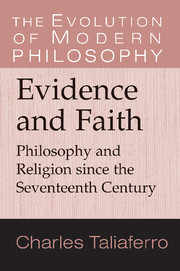Book contents
- Frontmatter
- Contents
- Acknowledgments
- Introduction
- 1 The Sovereignty of the Good in Seventeenth-Century Philosophy of Religion
- 2 Cartesian Philosophy of Religion
- 3 The Ascendancy of Rules of Evidence in Early Modern Philosophy of Religion
- 4 Humean Philosophy of Religion
- 5 Kantian Philosophy of Religion
- 6 Religion and the Philosophical Gods and Giants
- 7 Continental and Feminist Philosophy of Religion
- 8 Five Major Moves
- 9 Religions, Evidence, and Legitimacy
- Appendix A A Guide to Further Study
- Appendix B Select Contemporary Philosophers
- Select Bibliography
- Index
8 - Five Major Moves
Published online by Cambridge University Press: 15 December 2009
- Frontmatter
- Contents
- Acknowledgments
- Introduction
- 1 The Sovereignty of the Good in Seventeenth-Century Philosophy of Religion
- 2 Cartesian Philosophy of Religion
- 3 The Ascendancy of Rules of Evidence in Early Modern Philosophy of Religion
- 4 Humean Philosophy of Religion
- 5 Kantian Philosophy of Religion
- 6 Religion and the Philosophical Gods and Giants
- 7 Continental and Feminist Philosophy of Religion
- 8 Five Major Moves
- 9 Religions, Evidence, and Legitimacy
- Appendix A A Guide to Further Study
- Appendix B Select Contemporary Philosophers
- Select Bibliography
- Index
Summary
For my own part, I think that if one were looking for a single phrase to capture the stage to which philosophy has progressed, “the study of evidence” would be a better choice than “the study of language.” … The study of evidence goes further, inasmuch as it does not limit us, as “the study of language” appears to do, to elucidating the content of our beliefs, but also raises the question of our warrant for holding them; and this is surely a philosophical question when it is conceived in sufficient general terms…. We can give “the study of evidence” a broad enough interpretation to make it cover two questions which have returned into the forefront of philosophical interest. What are we justified in taking there to be? And how far is what there is of our own making?
A. J. AyerWhat light kindling your lamp of life
Brings you here to the world?
Rabindranath TagoreLunch and Mystical Poetry
In the early 1920s a group of scientifically oriented intellectuals began meeting in Vienna, Austria. The Vienna Circle, as it came to be called, was made up at first of a mathematician, a sociologist, and a physicist, but it soon attracted philosophers of considerable power and influence, many of whom had a strong grounding in mathematics and science.
- Type
- Chapter
- Information
- Evidence and FaithPhilosophy and Religion since the Seventeenth Century, pp. 337 - 391Publisher: Cambridge University PressPrint publication year: 2005

